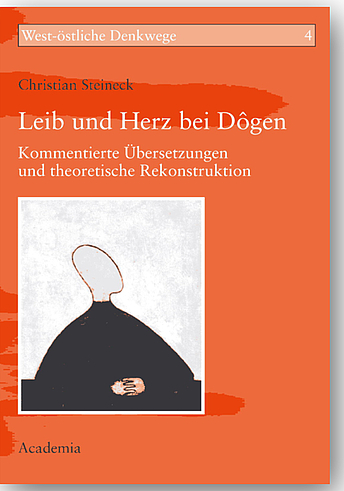Steineck
Leib und Herz bei Dôgen
ISBN 978-3-89665-258-4
englischThis volume presents seminal texts of the Japanese Zen-Master Dôgen (1200-1253) on the problem of body and mind in a new German translation with extensive commentary and philosophical analysis.
The body-mind-problem continues to draw a lot of attention, fuelled by an accelerated scientific and technological exploration and exploitation of the human physis and psyche. On the other hand, especially phenomenologists in recent decades have increasingly pointed to the import of Asian and East Asian traditions for a full picture of the human, psychophysical condition. The author subscribes to the view that it is important for the philosophical discourse on body and mind to take Non-European traditions into account. He therefore presents texts of one seminal Japanese thinker on this subject, alongside with explanations concerning the historical and biographical background, terminology and central concepts, and alternative interpretations.
During the past decades, a lot of research has already been conducted on Dôgen's thought and life. Many of his works have been translated into European languages, and there are several English translations of his main work, Shôbô genzô. However, the extant translations, while offering comments and explanations on technical terms and difficult passages, do not discuss alternative interpretations. In contrast, the author of this volume elucidates his interpretational choices, presenting alternative views and providing the reasoning for his hermeneutical decisions. Therefore, it is hoped that his translation and commentary will be of use to the English speaking reader as well.
The fundamental point of view informing the whole volume is that Dôgen's teachings are backed by a consistent theory of human existence. While the translations present his thoughts [and exhortations] in their own context, an analytical summary is given at the end of the volume that summarizes the theoretical aspects of his thought on body and mind.
Gegenstand des Bandes sind die Gedanken des japanischen Zen-Meisters Dôgen (1200-1253) zum Verhältnis von Leib und Seele. Das Leib-Seele-Problem ist gerade angesichts der sprunghaft wachsenden technischen Eingriffsmöglichkeiten in den menschlichen Körper und seine Funktionen (einschließlich der mentalen) von unverminderter Bedeutung. Dabei droht jedoch die philosophische Analyse durch die Vorgaben naturwissenschaftlicher und technischer Problemdefinitionen um entscheidende Dimensionen verkürzt zu werden. Es lohnt daher der Ausgriff auf distante Positionen, wie eben jene Dôgens, einer der bedeutendsten Figuren der japanischen Geistesgeschichte.
Das vorstehend erläuterte Interesse erfordert die kritische Auseinandersetzung, die das sachliche Anliegen Dôgens ernst nimmt, ohne ihre Thesen von vorneherein für unantastbar zu erklären. Um aber Anliegen wie Aussagen dieser Quelle angemessen zu verstehen, ist wiederum das Wissen um ihre historischen, sozialen und geistesgeschichtlichen Bezugspunkte eine ebenso wesentliche Voraussetzung wie andererseits das vor diesem Hintergrund gewonnene Wissen um die Sache, das Problem, auf das ihre Äußerungen bezogen sind. Der vorliegende Band wählt daher als Strategie in Erschließung, Übersetzung, Darstellung und Analyse von Dôgens Gedanken über Leib und 'Herz' (so der sinojapanische Inbegriff für die seelisch-geistigen Funktionen und ihren Träger) die theoretische Rekonstruktion. Das heisst, im Vordergrund steht das Interesse an den sich mit den Begriffen Leib und Herz verbindenden Sachproblemen, und ihre Erfassung und Lösung bei Dôgen bestimmt die Interpretation. Es wird dabei unterstellt, dass auch für Dôgen derartige Probleme im Mittelpunkt seines schriftstellerischen Schaffens standen, und dass er sich um eine (konsistente) Lösung der für ihn relevanten Problemaspekte bemühte.
Hauptziel des Buches ist es, Dôgens Konzeption von Leib und Seele für die philosophische Sachdiskussion zu präsentieren; japanologische Fachkenntnisse werden daher nicht vorausgesetzt. Gleichzeitig wird aber eine Lücke auf japanologischem und religionswissenschaftlichen Gebiet geschlossen, da wissenschaftliche Übersetzungen der im Band enthaltenen Texte bisher nicht vorlagen.


